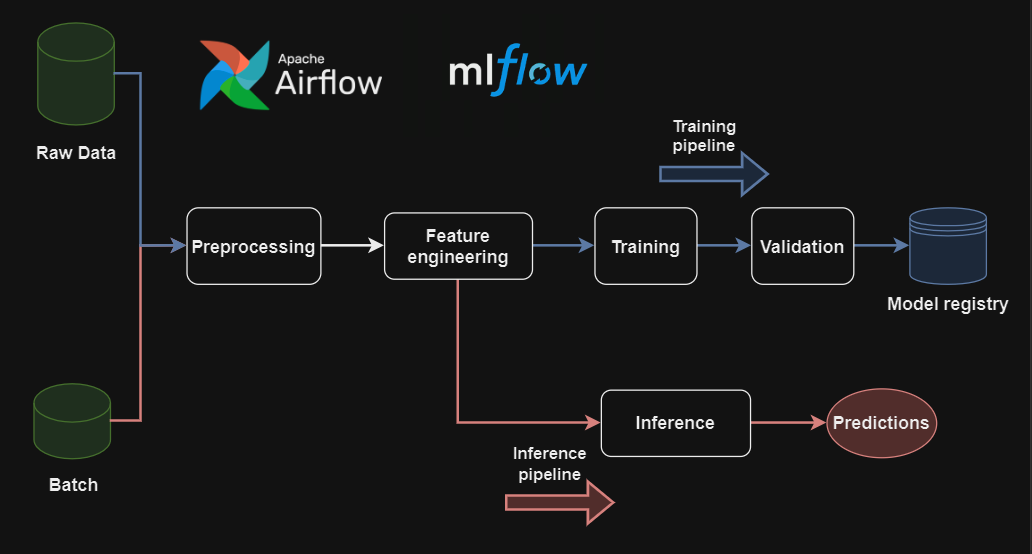In this repository, you'll find a project I handled during a Machine Learning assignment for a leader in the short-term rental industry.
The objective of this assignment was clear:
- Build a Machine Learning model to predict whether a reservation is likely to be cancelled,
- Develop an MLOps architecture designed for a production environment.
To accomplish this task, Airflow and Mlflow are used to build Machine Learning Pipelines, fully customizable and ready for a production environment.
.
├── README.md
├── airflow
│ ├── dags
│ │ ├── inference_pipeline.py
│ │ └── training_pipeline.py
├── artifacts
├── data
│ ├── features_store
│ ├── preprocessed
│ ├── hotel_bookings.parquet
│ └── sample_for_inference.parquet
├── mlflow
├── notebooks
│ ├── 0_exploratory_data_analysis.ipynb
│ └── 1_preprocessed_data_check.ipynb
├── requirements.txt
└── steps
├── condition_step.py
├── config.py
├── feature_engineering_step.py
├── inference_step.py
├── preprocess_step.py
├── train_step.py
└── utils
├── _artifact.py
└── data_classes.pyThe repository is structured as follows:
- Data Exploratory Analysis (EDA) is performed on notebooks,
- Each stage of the Machine Learning process (Preprocessing, Training, Inference, etc...) is defined as a module designed to be implemented into a pipeline. They are all located in the steps/ folder.
- Airflow and Mlflow are deployed locally within this repository.
- In the data folder is located the original dataset that was provided for this assignement, in addition of a sample for batch prediction. data/features_store and data/preprocessed are directories to store the data once processed by some stages of the pipelines, such as preprocessing or features_engineering steps.
- The same idea for artifacts that contains encoders generated during the features_engineering step.
The code runs with Airflow and Mlflow.
To launch these applications, open a terminal for each and type their respective command lines after having installed them. The complete procedure can be found in the
# Terminal 1
mlflow server --backend-store-uri mlflow/ --artifacts-destination mlflow/ --port 8000# Terminal 2
airflow standaloneContributions are what make the open source community such an amazing place to learn, inspire, and create. Any contributions you make are greatly appreciated.
If you have a suggestion that would make this better, please fork the repo and create a pull request. You can also simply open an issue with the tag "enhancement". Don't forget to give the project a star! Thanks again!
- Fork the Project
- Create your Feature Branch (
git checkout -b feature/AmazingFeature) - Commit your Changes (
git commit -m 'Add some AmazingFeature') - Push to the Branch (
git push origin feature/AmazingFeature) - Open a Pull Request
